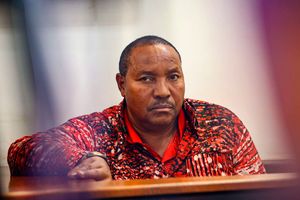Premium
Mystery persists over resignation of three IEBC commissioners

Electoral commissioners Paul Kurgat, Margaret Mwachanya (centre) and Connie Maina at The Stanley Hotel in Nairobi, when they announced their resignation from the IEBC on April 16, 2018. PHOTO | FILE | NATION MEDIA GROUP
What you need to know:
The commission on Saturday said it has not seen any evidence that the three indeed resigned
IEBC told the Nation that the three commissioners started clearing with the commission last week.
Amani National Congress leader Musalia Mudavadi called on Ms Maina, Dr Kurgat and Ms Mwachanya to end the confusion and formally tender their resignations.
Ms Maina, Dr Kurgat and Ms Mwachanya on April 16 announced their resignation from IEBC citing lack of confidence in the chairman Wafula Chebukati’s leadership.
Almost a month to the date when they read a joint statement announcing their resignation from the Independent Electoral and Boundaries Commission (IEBC), it is still not clear whether the three commissioners have indeed resigned.
The failure by President Uhuru Kenyatta who is the appointing authority to declare vacancies following the resignations is leaving questions whether he had accepted the resignations or not.
Without the gazettement, it is also giving room to speculation that the three commissioners, vice-chairperson Consolata Maina and commissioners Margaret Mwachanya and Paul Kurgat are technically still in office and drawing salaries and other benefits that come with the office of an IEBC commissioner.
The commission on Saturday said it has not seen any evidence that the three indeed resigned. However, the three commissioners have sworn separate affidavits in which they assert that they have resigned and are not receiving any salary, in a case in which activist Okiya Omtatah seeks to block Parliament from sending home the remaining commissioners.
CONFUSION
Adding to the confusion, IEBC told the Nation that the three commissioners started clearing with the commission last week.
“The commission has not received any evidence of their resignation to date. However, we have seen copies of sworn affidavits they submitted to courts indicating they have resigned,” the communication manager Andrew Limo said.
But Ms Maina said the law requires them to resign to the president, “and so the letters are submitted to the president”.
“Who is the appointing authority? If it is the President, then where is the problem?” she said.
Mr Limo, in response to whether the three commissioners have returned any commission property that had been in their possession by virtue of their offices such as motor vehicles, said the three commissioners had started clearing.
CLEARANCE
“The clearance process was initiated last week and is still ongoing. Records will be reconciled to ascertain compliance on the same,” said Mr Limo.
But Ms Maina said they had completed the clearance. “We have done everything we need to do,” she told the Nation.
Saturday, Amani National Congress (ANC) leader Musalia Mudavadi called on Ms Maina, Dr Kurgat and Ms Mwachanya to end the confusion and formally tender their resignations.
He also called for a clean-up of the commission to rid it of the remaining officials and members of the secretariat who have caused the current mess at IEBC.
“There is a tug of war between the secretariat and the commissioners. There is urgent need to clean up the mess in the IEBC. We demand that President Kenyatta provide leadership and get the commission back on its feet,” said Mr Mudavadi.
Ms Maina, Dr Kurgat and Ms Mwachanya on April 16 announced their resignation from IEBC citing lack of confidence in the chairman Wafula Chebukati’s leadership.
COMPULSORY LEAVE
This came after IEBC had sent on compulsory leave the CEO Ezra Chiloba to allow for “a comprehensive audit of all major procurements relating to the 2017 general and fresh presidential elections”.
The commission says there is “tremendous progress” with the audit and remains hopeful that it will be completed within the three-month deadline.
Mr Chiloba moved to court to challenge the decision and the matter is still pending. Mr Chiloba’s case is different from the one by Mr Omtatah.
Three days ago, Mr Chebukati asked the government to stop the salaries of the three commissioners – which are paid directly from the Consolidated Fund.
According to IEBC, the absence of the three commissioners from office for more than a month “would certainly be construed to mean desertion from duty or vacation of office” if not for their sworn affidavits in the case by Mr Omtatah.
POLICY DECISIONS
As the uncertainty surrounding the resignation of the three commissioners persists, IEBC also admitted that the lack of quorum was affecting the commission’s operations as the remaining commissioners can no longer enact new policy decisions.
“A number of resolutions, which had been passed before the resignations, are in the process of being implemented by the secretariat with the required oversight. However, enacting new policy decisions would require a quorum of five which we currently don’t have. It should be noted that most tasks are administrative and procedural and the oversight of the chairman and the two commissioners is sufficient,” said Mr Limo.
Among the policy decisions the commission was fortunate enough to pass before the quorum hitch involved the post-election evaluation, which is a requirement of law after every election.
EVALUATION
The outcome of the evaluation should inform legal, policy and institutional reforms as well as formulation of strategies going forward and marks the beginning of a new electoral cycle.
“The exercise and related budget was approved prior to the resignations of the said commissioners and what is ongoing is the implementation,” said Mr Limo.
As required by law, the commission is supposed to submit the final post-election evaluation report to Parliament, among other institutions and individuals.




